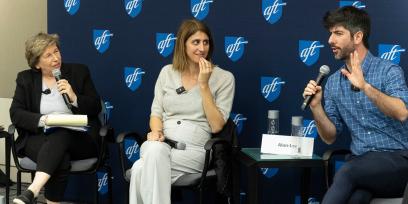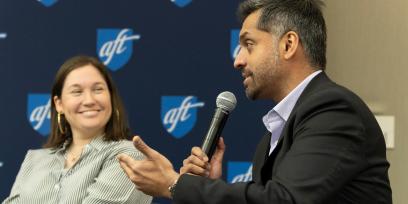The war in Gaza has been devastating, as millions of people endure unfathomable loss. It is also affecting many AFT members who have ties to the Middle East and/or serve in communities that are personally impacted by the violence. And so, amid the pain and turmoil, the AFT is joining voices with those working for peace between Jews and Palestinians.
On March 20, AFT President Randi Weingarten joined Race Forward Executive Vice President Eric Ward, Jewish Council for Public Affairs CEO Amy Spitalnick and Daily Beast columnist Wajahat Ali to host a roundtable and a panel discussion with leaders from Standing Together—a grassroots movement based in Israel to mobilize Jews and Palestinians in pursuit of peace, equality, and social and climate justice.
Sally Abed, head of development in Standing Together’s international department, and Alon-Lee Green, Standing Together’s national co-director, articulated the need to challenge the status quo and emphasized the importance of societal change and creating the political will to address the ongoing conflict and humanitarian crisis. Their audience—about 30 civil rights and religious leaders at the roundtable and 150 members of the civil rights, religious and peace communities at the panel discussion—were attentive and open to finding real solutions to the conflict and ways to move forward.
Ward opened by acknowledging the weight of the moment and noting that the world is in the midst of significant crises, from the turmoil in Israel and Gaza to the broader challenges facing our society. He called on the leaders in the room to rise to the occasion. “It is our job to bring solutions that move our communities forward together,” said Ward.
Spitalnick said the events of Oct. 7 shattered her sense of security but said that it is essential, now more than ever, to forge alliances that transcend divisive narratives to safeguard democracy. Ali agreed. “Each time something happens in Israel and Palestine, our communities are pitted against each other. ... Our multiracial democracy is under attack, and the work you do right now and what you model will decide our future,” he said.
“We’re witnessing one of the most catastrophic human losses and crises in decades,” said Weingarten in her introduction of Abed and Green. Weingarten noted that Standing Together has offered hope by advocating for mutual understanding and shared humanity.
Abed began by calling for an end to the myth that Jewish safety relies on Palestinian oppression and stressed the need for a ceasefire, an end to military control, and the pursuit of peace and equality for both people. Green echoed this sentiment, emphasizing the trauma inflicted on Israeli society and the imperative to move toward peace.
“We need to debunk the myth that Jewish safety is dependent on the oppression of Palestinians and military controlling Palestinians,” said Abed. “We’re here to demand a ceasefire agreement to stop the destruction and killing and to return the hostages back home. And we’re here to also ask for the end of military control, the end to the occupation, and for peace, freedom and equality for both peoples of the land. Standing Together is based on this understanding,” said Abed. “We need to build the political will ... to end the occupation, to go into a process of bilateral agreement of diplomatic relations of understanding how we can build a leadership that can ... imagine peace, a sustainable future for both peoples.”
Green highlighted the necessity of influencing Israeli society’s mindset to end the occupation rather than solely relying on external pressure. He argued that building political will within Israel is essential for a lasting solution and peace and warned of the consequences of maintaining the status quo, advocating instead for a shift toward a future of Israeli-Palestinian coexistence.
To end the war, Palestinian and Jewish citizens must be convinced that it is in their best interests, Green pointed out. “If we will not be able to build the political will within our society to convince the Israelis that this is our interest, not only out of an act of solidarity to stand with Palestinians but our interests … the occupation will continue,” said Green. “I want to polarize the public in a good way so the majority of people will choose the option of ending the occupation and oppression and achieving peace. That’s the role of Standing Together.”
Other dates on the educational tour have included panel discussions at a March 15 meeting of western U.S. AFT leaders in Las Vegas and at a March 18 Boston Teachers Union gathering. Upcoming events include a gathering with the Public Employees Federation in New York on March 22, and another with United Federation of Teachers leaders and members in New York on March 25.
[Adrienne Coles]


